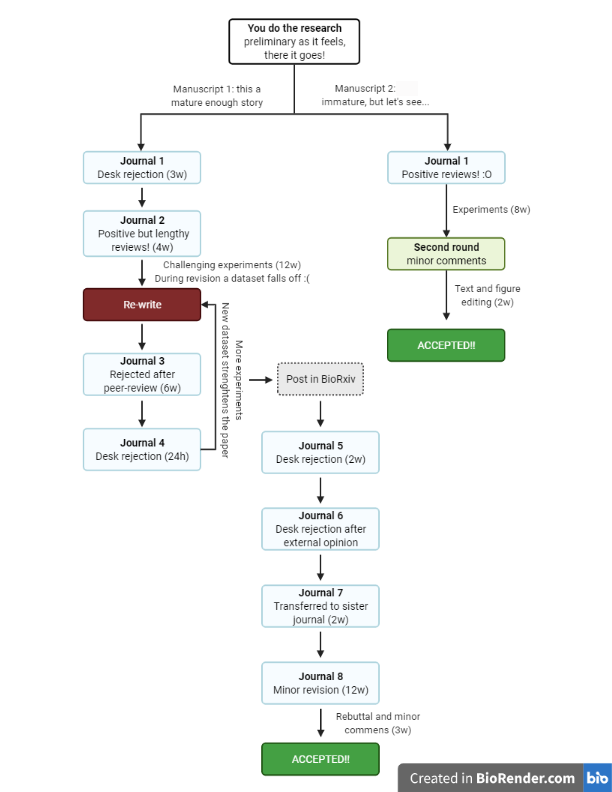
How should the scientific publishing of the future look like?
I am a newbie in scientific publishing – two papers to which I contributed as lead author have just been recently accepted. Thus, I am just starting to grasp how this industry works, and to understand why it is under scrutiny. Let me tell you: I am already tired! Here is a screenshot of the news we shared following publication of one of those papers:

And below, what actually happened behind the scenes:

I wasn’t yet aware of how it feels to push your project to the end line when I met Professor Peter Walter. He holds a clear stand, which he has made sure to disseminate in opinion pieces such as from symbiont to parasite: the evolution of for-profit science publishing.
“When hiring new postdocs, I tell them that if they are looking for that Nature paper, they better go find it somewhere else”, he explained.
He categorically ignores this type of high-impact, multidisciplinary journal. His opinion comes with a bold vision for the future: transparent, journal-independent peer review and strict open access publishing in research repositories.
In such scenario, “journals will have to become [news] magazines”, he mentioned.
I am personally excited by such a model but cannot help but think how utopic it can sound for an early career researcher. At the end of the day, the metrics by which academic success are measured and judged upon keep on relying on H-indexes: can turning the wheels effectively come from the bottom-up? Changing the publishing model would require funding agencies and institutions to change their criteria. The values of academics would probably need to be re-evaluated.

Common points of reflection are:
- How should peer review work? (when, where, how and who?)
- Should peer review and editorial work rely on the altruistic efforts of the scientific community? Is that sustainable in the long run?
- Are for-profit publishing houses and their business model compatible with the values in academia?
- If not altruistic, how should peer review and other publishing-related tasks be rewarded? If moving to a model in which research is only published in free repositories, how should they be maintained?
- How can open access, with its often prohibiting article processing charges (APC), become accessible to lower income countries?
- How can we redefine academic success?
Magdalena Skipper, Editor-in-Chief of Nature, was invited to the podcast The Lonely Pipette to discuss, amongst others, open access. In that context, the hosts and her discussed about the role that Nature plays, as a transformative journal, in abolishing the paywalls that restrict access to scientific literature. While Springer Nature is part of the Research4Life partnership (with the aim of guaranteeing equitable access to research papers in lower income countries), when asked about equitable publishing opportunities (i.e, how lower income countries can face the high APC of publishing without paywalls), her response was somewhat elusive, alluding to the responsibility of the scientific community in speeding up the transition to open access:
“you as the author have the choice of which model you submit under [traditional subscription-based, or open access]” and “if everybody wants to publish open access, then it becomes an open access journal, right?”
In these statements, I think there is an important message coming through: authors who are privileged enough to actually have a real choice, also have the responsibility of being informed and aware of the issues, so they can act accordingly.
On those lines, the online platform Crastina is currently covering all these aspects to publishing under the theme “is scientific publishing perishing?”. The theme also includes a panel discussion this Friday, 8th of October https://crastina.se/future_publishing_discussion/.
Innovative solutions to this long-standing source of frustration may only come from engaged minds. Do you have any thoughts or experiences with publishing you’d like to share? Leave us a comment below!

0 comments